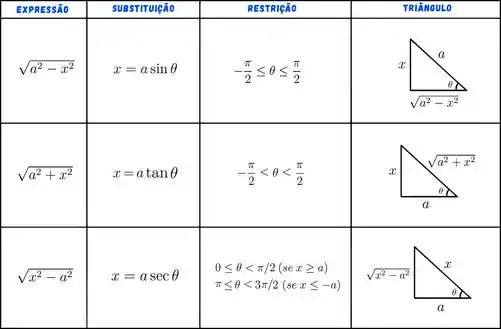Calcule a integral indefinida:
Passo 1
Pessoal, podemos fazer essa integral de duas formas: calcular a indefinida e no final resolver a definida ou ir resolvendo direto trocando os limites de integração.
Nesta eu vou resolver a indefinida e no final a definida, ok? A primeira coisa que devemos fazer aqui para resolver a integral indefinida é saber qual substituição trigonométrica usar.
Como nós temos no denominador, isso indica a substituição com a tangente, como vocês podem ver a seguir no quadro de substituições com os respectivos triângulos e intervalos.

Olhando o quadrinho, percebemos que a substituição deve ser .
Passo 2
Façamos então a substituição:
Dessa forma, .
Passo 3
Agora vamos trocar a variável da integral utilizando:
Considerando os intervalos adequados, podemos tirar o da raiz sem o módulo.
Agora faremos uma substituição . Ficamos então com:
Passo 4
Podemos resolver essa integral utilizando .
Passo 5
Como a integral indefinida foi dada na variável , devemos dar a resposta nesta variável. Sendo e , então:
Para achar , nós olhamos o triângulo da substituição tangente construído no inicio e utilizamos essas relações trigonométricas. Temos então:
Dessa forma, o resultado da integral será:
Passo 6
Agora vamos resolver a definida utilizando a primitiva acima.
Sabemos da integral definida que:
Em que é uma primitiva de .
Dessa forma,
E esse é o nosso resultado.